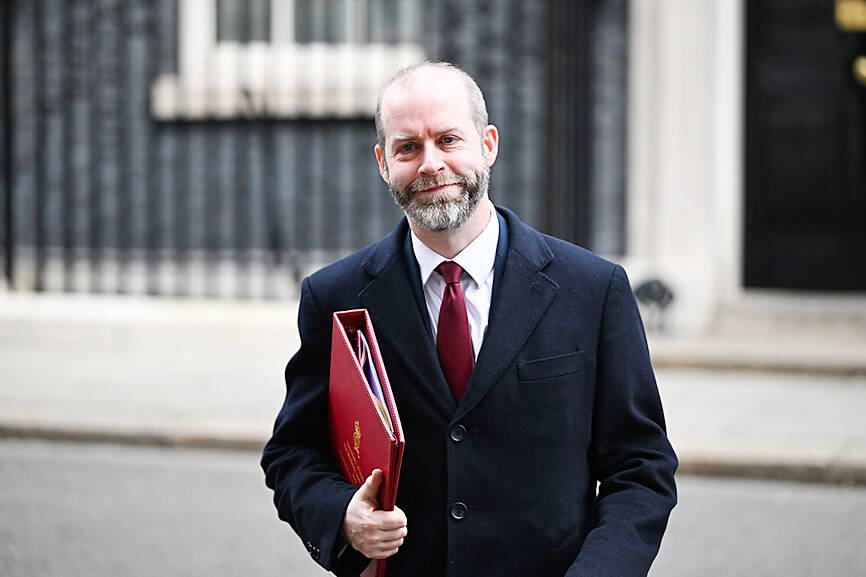The British government is weighing plans to reduce or even abolish its digital services tax before Wednesday next week to avoid the worst of US President Donald Trump’s trade tariffs.
The British Treasury is considering several options for modifying the so-called tech tax that were proposed by the British Department for Business and Trade, a person briefed on the discussions said.
The possible changes do not include company-specific carve-outs, the person said.

Photo: Bloomberg
The discussions come after the US administration raised their opposition to the tax as part of talks on a “new economic deal” which Trump and British Prime Minister Keir Starmer agreed to explore last month.
The levy is charged at 2 percent of the revenues derived from British users by search engines, social media companies and online marketplaces, making it unpopular with US firms such as Google parent Alphabet Inc, Facebook and Instagram owner Meta Platforms Inc, and Amazon.com Inc.
Trump is conducting a review of all US trading partners, with a view to imposing “reciprocal” tariffs on Wednesday next week in response to anything he deems a tariff or a non-tariff barrier to trade.
British Secretary of State for Business and Trade Jonathan Reynolds on Tuesday last week met in Washington with US administration officials including US Secretary of Commerce Howard Lutnick, US Trade Representative Jamieson Greer and special envoy Mark Burnett.
One person familiar with the discussions said Reynolds was hoping to reach an agreement with the US on the tech levy before Wednesday next week and secure an exemption from further tariffs.

SEMICONDUCTOR SERVICES: A company executive said that Taiwanese firms must think about how to participate in global supply chains and lift their competitiveness Taiwan Semiconductor Manufacturing Co (TSMC, 台積電) yesterday said it expects to launch its first multifunctional service center in Pingtung County in the middle of 2027, in a bid to foster a resilient high-tech facility construction ecosystem. TSMC broached the idea of creating a center two or three years ago when it started building new manufacturing capacity in the US and Japan, the company said. The center, dubbed an “ecosystem park,” would assist local manufacturing facility construction partners to upgrade their capabilities and secure more deals from other global chipmakers such as Intel Corp, Micron Technology Inc and Infineon Technologies AG, TSMC said. It

NO BREAKTHROUGH? More substantial ‘deliverables,’ such as tariff reductions, would likely be saved for a meeting between Trump and Xi later this year, a trade expert said China launched two probes targeting the US semiconductor sector on Saturday ahead of talks between the two nations in Spain this week on trade, national security and the ownership of social media platform TikTok. China’s Ministry of Commerce announced an anti-dumping investigation into certain analog integrated circuits (ICs) imported from the US. The investigation is to target some commodity interface ICs and gate driver ICs, which are commonly made by US companies such as Texas Instruments Inc and ON Semiconductor Corp. The ministry also announced an anti-discrimination probe into US measures against China’s chip sector. US measures such as export curbs and tariffs

The US on Friday penalized two Chinese firms that acquired US chipmaking equipment for China’s top chipmaker, Semiconductor Manufacturing International Corp (SMIC, 中芯國際), including them among 32 entities that were added to the US Department of Commerce’s restricted trade list, a US government posting showed. Twenty-three of the 32 are in China. GMC Semiconductor Technology (Wuxi) Co (吉姆西半導體科技) and Jicun Semiconductor Technology (Shanghai) Co (吉存半導體科技) were placed on the list, formally known as the Entity List, for acquiring equipment for SMIC Northern Integrated Circuit Manufacturing (Beijing) Corp (中芯北方積體電路) and Semiconductor Manufacturing International (Beijing) Corp (中芯北京), the US Federal Register posting said. The

India’s ban of online money-based games could drive addicts to unregulated apps and offshore platforms that pose new financial and social risks, fantasy-sports gaming experts say. Indian Prime Minister Narendra Modi’s government banned real-money online games late last month, citing financial losses and addiction, leading to a shutdown of many apps offering paid fantasy cricket, rummy and poker games. “Many will move to offshore platforms, because of the addictive nature — they will find alternate means to get that dopamine hit,” said Viren Hemrajani, a Mumbai-based fantasy cricket analyst. “It [also] leads to fraud and scams, because everything is now